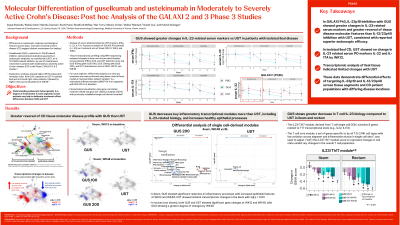Tuesday Poster Session
Category: IBD
P5445 - Molecular Differentiation of Guselkumab and Ustekinumab in Moderately to Severely Active Crohn’s Disease: Post Hoc Analysis of the GALAXI 2 and 3 Phase 3 Studies
Tuesday, October 28, 2025
10:30 AM - 4:00 PM PDT
Location: Exhibit Hall

Has Audio

Patrick Branigan, BS
Johnson & Johnson
Spring House, PA
Presenting Author(s)
Dylan Richards, PhD1, Klebea Sohn, PhD1, Martha Zeeman, MS1, Ruchi Patel, MS1, Bradford McRae, PhD1, Nat A. Terry, MD, PhD2, Marion L. Vetter, MD2, Walter Reinisch, MD, PhD3, Daniel Cua, PhD1, Patrick Branigan, BS2
1Janssen Research & Development, LLC, Spring House, PA, USA, Spring House, PA; 2Johnson & Johnson, Spring House, PA; 3Division of Gastroenterology & Hepatology, Medical University of Vienna, Vienna, Wien, Austria
Introduction: Guselkumab (GUS) is a selective dual-acting IL-23p19 subunit inhibitor that potently blocks interleukin 23 (IL-23) and binds to CD64, a receptor on cells that produce IL-23. In patients with moderately to severely active Crohn’s disease (CD), the GALAXI-2 and GALAXI-3 Phase 3 studies established short- and long-term efficacy of GUS compared to placebo, and statistical superiority to ustekinumab (UST) in prespecified analyses of pooled data at Week (WK48). Here we report molecular differentiation of GUS compared with UST in isolated ileal disease using pooled samples from the GALAXI studies.
Methods: Patients (pts) in GALAXI-2 (n=508) and GALAXI-3 (n=513) were randomized 2:2:2:1 to receive GUS 200mg IV q4w x3 → GUS 200mg SC q4w or GUS 100mg SC q8w, UST ⁓6mg/kg → UST 90mg SC q8w or placebo (PBO). Serum biomarkers were measured in a subset of (n=50) pts per group at WK0, WK4 and WK12. Matched ileal and rectal biopsies were evaluated at WK0, WK12 and WK48 in a subset of 344 pts representative of the study population. Transcriptional profiling was performed with RNA sequencing using transcriptional modules. Analysis was performed using molecularly inflamed samples at baseline. Serum proteins and transcriptional modules were evaluated for differential expression stratified by ileal, colonic and ileocolonic disease.
Results: In pts with isolated ileal disease, GUS decreased serum levels of IL-22, IL-17A and IFNγ at WK12 while UST only reduced IFNγ. In ileal tissue, GUS significantly altered inflammatory transcriptomic modules at WK12 and WK48 including reductions in neutrophil, inflamed epithelium, IL-23/Th17 and inflammatory fibroblast biology compared with UST. In pts with colonic or ileocolonic disease, both GUS and UST decreased IL-23-dependent serum proteins towards normal levels compared with independent healthy control sera. In rectal tissue, both GUS and UST significantly altered key inflammatory transcriptional modules in rectal biopsies at WK12 and WK48.
Discussion: GUS decreased IL-23-dependent serum proteins and improved tissue transcriptional profiles in pts with isolated ileal disease while UST had a minimal impact on IL-23-dependent transcriptional modules. These data suggest potential differences in IL-23 and IL-12 pathway enrichment in isolated ileal disease where inhibition of IL-23p19 subunit with GUS achieved greater molecular treatment effects early which were maintained through WK48 and associated with differential clinical outcomes in patients with isolated ileal disease.
Disclosures:
Dylan Richards, PhD1, Klebea Sohn, PhD1, Martha Zeeman, MS1, Ruchi Patel, MS1, Bradford McRae, PhD1, Nat A. Terry, MD, PhD2, Marion L. Vetter, MD2, Walter Reinisch, MD, PhD3, Daniel Cua, PhD1, Patrick Branigan, BS2. P5445 - Molecular Differentiation of Guselkumab and Ustekinumab in Moderately to Severely Active Crohn’s Disease: Post Hoc Analysis of the GALAXI 2 and 3 Phase 3 Studies, ACG 2025 Annual Scientific Meeting Abstracts. Phoenix, AZ: American College of Gastroenterology.
1Janssen Research & Development, LLC, Spring House, PA, USA, Spring House, PA; 2Johnson & Johnson, Spring House, PA; 3Division of Gastroenterology & Hepatology, Medical University of Vienna, Vienna, Wien, Austria
Introduction: Guselkumab (GUS) is a selective dual-acting IL-23p19 subunit inhibitor that potently blocks interleukin 23 (IL-23) and binds to CD64, a receptor on cells that produce IL-23. In patients with moderately to severely active Crohn’s disease (CD), the GALAXI-2 and GALAXI-3 Phase 3 studies established short- and long-term efficacy of GUS compared to placebo, and statistical superiority to ustekinumab (UST) in prespecified analyses of pooled data at Week (WK48). Here we report molecular differentiation of GUS compared with UST in isolated ileal disease using pooled samples from the GALAXI studies.
Methods: Patients (pts) in GALAXI-2 (n=508) and GALAXI-3 (n=513) were randomized 2:2:2:1 to receive GUS 200mg IV q4w x3 → GUS 200mg SC q4w or GUS 100mg SC q8w, UST ⁓6mg/kg → UST 90mg SC q8w or placebo (PBO). Serum biomarkers were measured in a subset of (n=50) pts per group at WK0, WK4 and WK12. Matched ileal and rectal biopsies were evaluated at WK0, WK12 and WK48 in a subset of 344 pts representative of the study population. Transcriptional profiling was performed with RNA sequencing using transcriptional modules. Analysis was performed using molecularly inflamed samples at baseline. Serum proteins and transcriptional modules were evaluated for differential expression stratified by ileal, colonic and ileocolonic disease.
Results: In pts with isolated ileal disease, GUS decreased serum levels of IL-22, IL-17A and IFNγ at WK12 while UST only reduced IFNγ. In ileal tissue, GUS significantly altered inflammatory transcriptomic modules at WK12 and WK48 including reductions in neutrophil, inflamed epithelium, IL-23/Th17 and inflammatory fibroblast biology compared with UST. In pts with colonic or ileocolonic disease, both GUS and UST decreased IL-23-dependent serum proteins towards normal levels compared with independent healthy control sera. In rectal tissue, both GUS and UST significantly altered key inflammatory transcriptional modules in rectal biopsies at WK12 and WK48.
Discussion: GUS decreased IL-23-dependent serum proteins and improved tissue transcriptional profiles in pts with isolated ileal disease while UST had a minimal impact on IL-23-dependent transcriptional modules. These data suggest potential differences in IL-23 and IL-12 pathway enrichment in isolated ileal disease where inhibition of IL-23p19 subunit with GUS achieved greater molecular treatment effects early which were maintained through WK48 and associated with differential clinical outcomes in patients with isolated ileal disease.
Disclosures:
Dylan Richards: Johnson and Johnson – Employee, Stock Options, Stock-publicly held company(excluding mutual/index funds).
Klebea Sohn: Johnson and Johnson – Employee, Stock Options, Stock-publicly held company(excluding mutual/index funds).
Martha Zeeman: Johnson and Johnson – Employee, Stock Options, Stock-publicly held company(excluding mutual/index funds).
Ruchi Patel: Johnson and Johnson – Employee, Stock Options, Stock-publicly held company(excluding mutual/index funds).
Bradford McRae: Johnson and Johnson – Employee, Stock Options, Stock-publicly held company(excluding mutual/index funds).
Nat Terry: Johnson & Johnson – Employee, Stock Options, Stock-publicly held company(excluding mutual/index funds).
Marion Vetter: Johnson & Johnson – Employee, Stock Options, Stock-publicly held company(excluding mutual/index funds).
Walter Reinisch: AbbVie – Advisory Committee/Board Member, Consultant, Grant/Research Support, Speakers Bureau. Amgen – Advisory Committee/Board Member, Consultant. AOP Orphan – Consultant. Boehringer Ingelheim – Advisory Committee/Board Member, Consultant. Bristol Myers Squibb – Advisory Committee/Board Member, Consultant. Calyx – Consultant. Cellitrion – Advisory Committee/Board Member, Consultant, Speakers Bureau. Eli Lilly – Consultant. Ferring – Speakers Bureau. Galapagos – Advisory Committee/Board Member, Consultant, Speakers Bureau. Gilead – Consultant. Index Pharma – Consultant. Johnson and Johnson – Advisory Committee/Board Member, Consultant, Grant/Research Support, Speakers Bureau. Medahead – Consultant. Microbiotica – Consultant. MSD – Speakers Bureau. Pfizer – Advisory Committee/Board Member, Consultant, Speakers Bureau. Roche – Speakers Bureau. Sandoz – Grant/Research Support. Sanofi – Grant/Research Support. Sobi – Speakers Bureau. Takeda – Consultant, Grant/Research Support, Speakers Bureau.
Daniel Cua: Johnson and Johnson – Employee, Stock Options, Stock-publicly held company(excluding mutual/index funds).
Patrick Branigan: Johnson & Johnson – Employee, Stock-publicly held company(excluding mutual/index funds).
Dylan Richards, PhD1, Klebea Sohn, PhD1, Martha Zeeman, MS1, Ruchi Patel, MS1, Bradford McRae, PhD1, Nat A. Terry, MD, PhD2, Marion L. Vetter, MD2, Walter Reinisch, MD, PhD3, Daniel Cua, PhD1, Patrick Branigan, BS2. P5445 - Molecular Differentiation of Guselkumab and Ustekinumab in Moderately to Severely Active Crohn’s Disease: Post Hoc Analysis of the GALAXI 2 and 3 Phase 3 Studies, ACG 2025 Annual Scientific Meeting Abstracts. Phoenix, AZ: American College of Gastroenterology.
